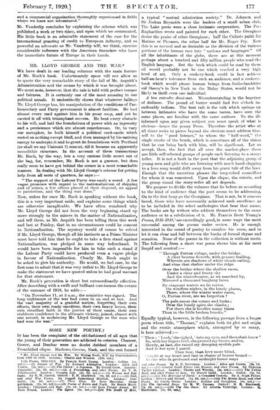MR.. LLOYD GEORGE AND THE WAR.*
WE have dealt in our heeling columns with the main feature of Mr. Roch's book. Unfortunately space will not allow us to quote the very remarkable story of the fall of Mr. Asquith's Administration and the means by which it was brought about.
We must note, however, that the tale is told with perfect temper and fairness. It is certainly one of the most amazing in our political annals. It undoubtedly shows that whatever failings
Mr. Lloyd George has, his manipulation of the conditions of Par- liamentary and Party government is almost faultless. He had almost every card against him in his great coop, and yet he carried it off with triumphant success. He bent every obstacle to his will, and laid the foundations of power with an ingenuity and a persistence -which are almost superhuman. Or, to vary our metaphor, he built himself a political card-castie which
rested on nothing -except bluff, and then managed by his untiring energy to underpin it and to grout its foundations with Portland (or shall we say Unionist ?) cement, till it became an apparently monolithic structure. In the account of these transactions Mr. Roch, by the way, lets a very °miens little secret out of the bag, for, remember, Mr. Roth is not a guesser, but does really seem to have got behind the scenes in a most remarkable
manner. In dealing with Mr. Lloyd George's scheme for getting help from all sorer of quarters, he says :- " The support of the Labour Party was easily .s-oared A few vague promises with regard to the naibicanalizatian of pping and of mines, a few offices placed at their disposal, an appeal to patriotism, and the thing was done."
Now, unless for once Mr. Roch is speaking without the book, this is a very important -aside, and explains some things which are otherwise inexplicable. We have often wondered why Mr. Lloyd George did not from the very beginning stand up more strongly to the miners in the matter of Nationalization,
and tell them, as Mr. Asquith has been telling them this week and last at Paisley, that in no circumstances could he consent to Nationalization. The mystery would of course be solved if Mr. Lloyd George, though all his instincts as a Prime Minister must have told him that he ought to take a firm stand against
Nationalization, was pledged in some way beforehand. It would have been impossible for him to take such a stand if the Labour Party could have produced even a vague pledge in favour of Nationalization. Clearly Mr. Roch ought to be asked to give his authority. He would, we feel sure, be the first man to admit that it was very unfair to Mr. Lloyd George to make the statement we have quoted unless he had good warrant for that statement.
Mr. Roch's peroration is short but extraordinarily effective. After describing with a swift and brilliant conciseness the events of the summer of 1918, he adds :-
" On November n, at 5 a.m., the armistice was signed. The long nightmare of the war had come to an end at last. And the vast majority of a grateful nation, forgetting their own efforts, their own ready sacrifices, their own heavy losses, their own steadfast faith in the justice of their cause, their own stubborn confidence in the ultimate victory, joined, almost with one accord, in acclaiming Mr. Lloyd George as the man who had wen the war."






































 Previous page
Previous page